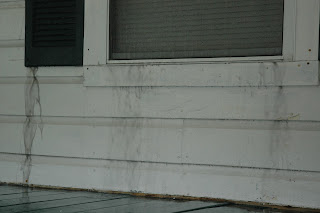We first spoke with Deb, who told us about the problems with water she has had as a result of the deep mine less than 200 yards from her house. Prior to the mine, they had one well that provided them with water for years. Since the mine has been there, they have had two additional wells that have all caused significant problems and negatively affect the health and well being of her and her children. They were told that the current well is safe and will not have the problems with methane that the others had, but at the same time they told her that it would be unwise for anyone to smoke around the well. Methane has no scent, but it’s highly explosive and poisonous.


The effects of coal dust from the mine site on her two young children (ages 6 and 4) are a huge source of concern for Deb, who is a respiratory therapist. She has noticed a consistent cough and respiratory problems in herself and her children, which she believes is a result of the large amount of coal dust that blows from the mine. The dust has also caused sties to form on her 6-year-old son’s eye, which the eye doctor confirmed as being a result of the coal dust. The large amount of coal dust that coats their house also means that they must spend a great deal of time washing the house and anything that might sit outside—toys, a trampoline, etc. She described her children’s hands and feet as being black whenever they play outside, meaning that they must limit their time outdoors for their safety. There have not been adequate studies on the effects of methane or the coal dust on the children, something that the entire family worries about.


The wind is another problem that has resulted lately due to the mountain top removal that also surrounds their land. While these are no longer active, the removal of the trees and top soil means that the wind speeds have significantly increased—prior to our arrival, there was a windstorm so severe that it blew the large and heavy trampoline from one side of their house, over the house, finally landing in the creek nearby. The son is now so frightened by the wind that he requested that we go inside as soon as the wind picked up a bit. Deb said that she and her sons were forced to stay in the closet all night during the high winds.

After speaking with Deb and her son Gage, we went and met Rick’s father, Clinton. He has lived on his land all of his life and feels a deep sense of connection to the land and the community that has been built on it. He remembered times where he and his wife would sit out on their porch and watch the animals come down the hill. He said that neighbors saw him there so often that they called it his “roost.” His schedule was based on a life lived outdoors and with a deep sense of connection to the people and landscape.
Now, due to the deep mine, he is unable to spend much time outdoors due to the amount of coal dust in the air. The noise and harassment he has directly experienced as a result of the miners has also been a problem that has negatively affected his quality of life. He described several instances of harassment and intimidation by the miners.


Due to other health concerns including emphysema and stomach cancer, his health is precarious and fragile. The stress of the mines has led him to use anti-anxiety medication as a means of coping; in addition, he must also leave the holler every now and then in order to escape the constant stress and coal dust on his already weakened lungs. The place he once knew as home is now a stressful and unhealthy environment.
The large amount of coal dust in the air also means that they are unable to grow their own food, something that the community members had previously relied upon for a large portion of their diet. Clinton and Rick showed us dozens of containers of canned food ranging from tomatoes to venison that they had grown and canned themselves. During growing season, the dust now covers the crops.



No comments:
Post a Comment